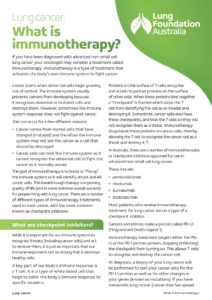Immunotherapy is a type of cancer treatment that helps your immune system fight cancer. It works by boosting or changing how the immune system functions so it can find and attack cancer cells more effectively.
Checkpoint inhibitors are a type of immunotherapy. They work by blocking proteins that prevent the immune system from attacking cancer cells. These proteins, known as checkpoints, normally keep immune responses from being too strong. By inhibiting these checkpoints, the immune system can respond more aggressively to cancer.
Immunotherapy can be administered in several ways, including:
- Intravenously (IV) through a vein.
- Subcutaneously as an injection under the skin.
- Orally as pills or capsules.
- Directly into a body cavity, such as the bladder.
Monitoring the effectiveness of immunotherapy involves regular check-ups with your healthcare provider. They may use physical exams, imaging tests, and blood tests to measure how the cancer responds to treatment. A positive response is typically indicated by the tumor shrinking, staying the same size, or becoming more controlled.
Side Effects: Like all treatments, immunotherapy can have side effects. Common side effects include fatigue, skin reactions, flu-like symptoms, and digestive issues. More serious side effects can occur if the immune system starts attacking healthy cells in the body. It is important to report any side effects to your healthcare team promptly so they can be managed effectively.
Benefits: Immunotherapy has shown promise in treating various types of cancer, including lung cancer. It can provide long-lasting responses and, in some cases, lead to remission. Unlike traditional treatments, immunotherapy can continue to work even after treatment has ended, as the immune system remains vigilant against cancer cells.
Challenges: Not all patients respond to immunotherapy, and researchers are still working to understand why. Additionally, immunotherapy can be expensive and may not be covered by all insurance plans. Access to treatment can also be a challenge, particularly in rural or underserved areas.
For further support, you can contact Lung Foundation Australia. They offer guidance, information, and support for those with lung disease. You can reach them at 1800 654 301 or visit their website for more details. This organization provides valuable resources and assistance to help patients and their families navigate the complexities of lung cancer treatment and care.
Was this page helpful?
Good job! Please give your positive feedback
How could we improve this post? Please Help us.




